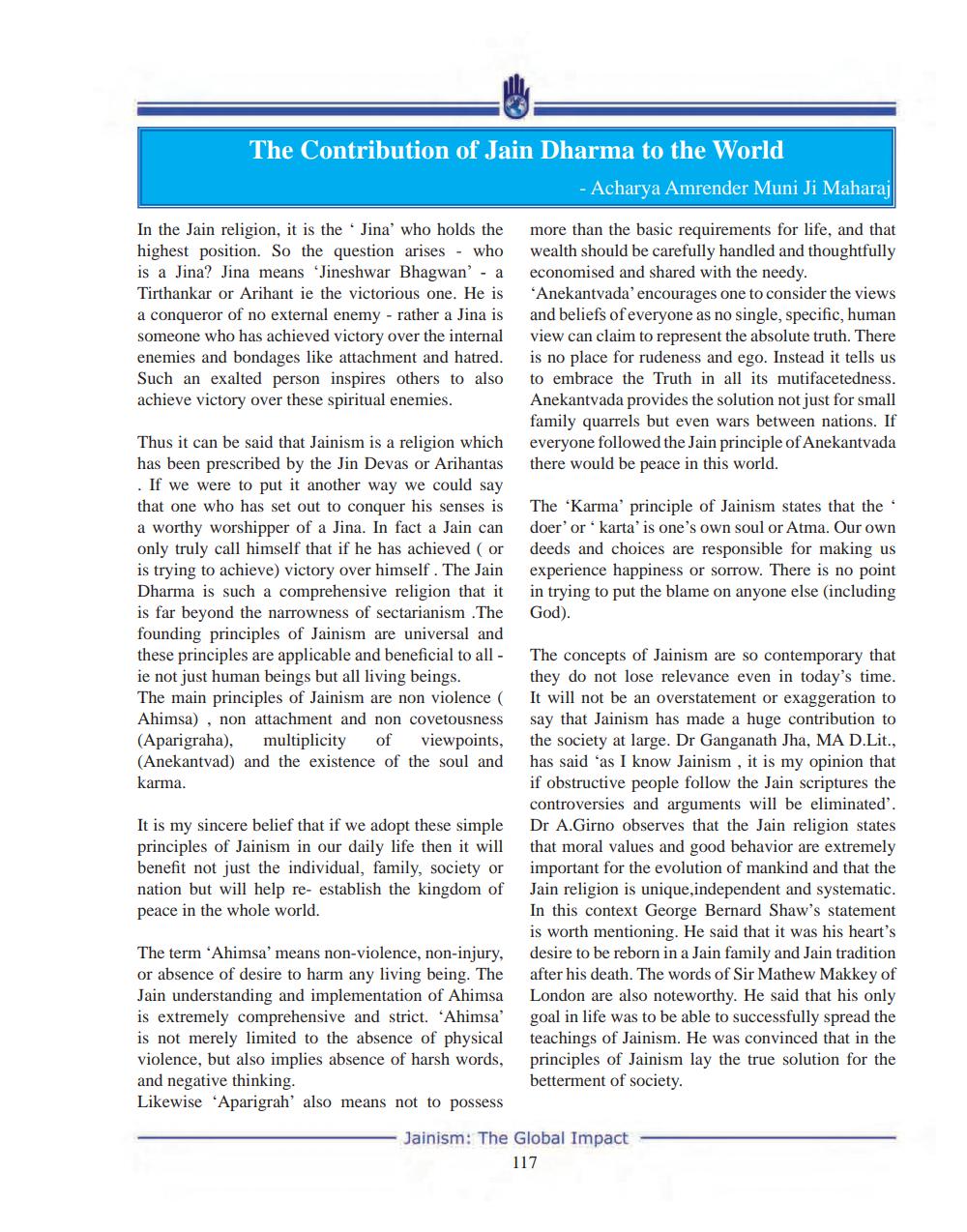________________
The Contribution of Jain Dharma to the World
In the Jain religion, it is the Jina' who holds the highest position. So the question arises who is a Jina? Jina means 'Jineshwar Bhagwan' - a Tirthankar or Arihant ie the victorious one. He is a conqueror of no external enemy - rather a Jina is someone who has achieved victory over the internal enemies and bondages like attachment and hatred. Such an exalted person inspires others to also achieve victory over these spiritual enemies.
Thus it can be said that Jainism is a religion which has been prescribed by the Jin Devas or Arihantas . If we were to put it another way we could say that one who has set out to conquer his senses is a worthy worshipper of a Jina. In fact a Jain can only truly call himself that if he has achieved (or is trying to achieve) victory over himself. The Jain Dharma is such a comprehensive religion that it is far beyond the narrowness of sectarianism .The founding principles of Jainism are universal and these principles are applicable and beneficial to all - ie not just human beings but all living beings. The main principles of Jainism are non violence ( Ahimsa), non attachment and non covetousness (Aparigraha), multiplicity of viewpoints, (Anekantvad) and the existence of the soul and karma.
It is my sincere belief that if we adopt these simple principles of Jainism in our daily life then it will benefit not just the individual, family, society or nation but will help re- establish the kingdom of peace in the whole world.
The term 'Ahimsa' means non-violence, non-injury, or absence of desire to harm any living being. The Jain understanding and implementation of Ahimsa is extremely comprehensive and strict. 'Ahimsa' is not merely limited to the absence of physical violence, but also implies absence of harsh words, and negative thinking. Likewise 'Aparigrah' also means not to possess
- Acharya Amrender Muni Ji Maharaj
more than the basic requirements for life, and that wealth should be carefully handled and thoughtfully economised and shared with the needy. 'Anekantvada' encourages one to consider the views and beliefs of everyone as no single, specific, human view can claim to represent the absolute truth. There is no place for rudeness and ego. Instead it tells us to embrace the Truth in all its mutifacetedness. Anekantvada provides the solution not just for small family quarrels but even wars between nations. If everyone followed the Jain principle of Anekantvada there would be peace in this world.
The 'Karma' principle of Jainism states that the doer' or 'karta' is one's own soul or Atma. Our own deeds and choices are responsible for making us experience happiness or sorrow. There is no point in trying to put the blame on anyone else (including God).
The concepts of Jainism are so contemporary that they do not lose relevance even in today's time. It will not be an overstatement or exaggeration to say that Jainism has made a huge contribution to the society at large. Dr Ganganath Jha, MA D.Lit., has said 'as I know Jainism, it is my opinion that if obstructive people follow the Jain scriptures the controversies and arguments will be eliminated'. Dr A.Girno observes that the Jain religion states that moral values and good behavior are extremely important for the evolution of mankind and that the Jain religion is unique,independent and systematic. In this context George Bernard Shaw's statement is worth mentioning. He said that it was his heart's desire to be reborn in a Jain family and Jain tradition after his death. The words of Sir Mathew Makkey of London are also noteworthy. He said that his only goal in life was to be able to successfully spread the teachings of Jainism. He was convinced that in the principles of Jainism lay the true solution for the betterment of society.
Jainism: The Global Impact
117




